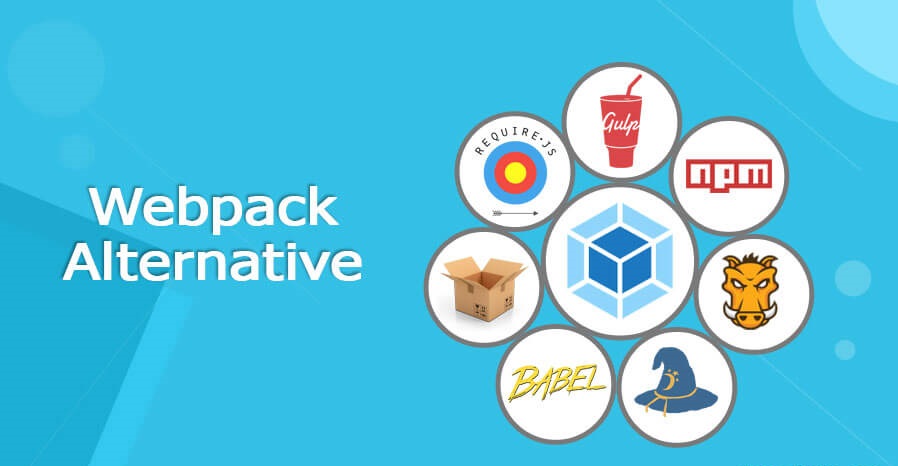This post will explain webpack alternatives. Webpack is an open-source JavaScript module primarily created for JavaScript. It can change front-end assets such as HTML, CSS, and images if corresponding loaders are consisted of. Webpack takes the reliances and basic dependency graph enabling web developers to use a modular method for their web application development process. It likewise supplies built-in advancement server called a webpack dev server that can be utilized as an HTTP server for serving files while establishing. There are some alternatives to Webpack that offer the exact same performance as webpack. These alternatives are gulp, babel, parcel and browserify, grunt, npm, & requireJS. In this article, we are continuing to discuss these alternatives.
Introduction to Webpack Alternative In 2021
In this article, you can know about webpack alternatives here are the details below;
Top 7 Alternatives of Webpack
Alternatives of webpack are provided listed below:
1. Gulp:
Gulp is the best option for webpack. It is an open-source JavaScript toolkit, utilized for streaming build systems in front-end web advancement. It is a job runner which is formed on nom and node.js. Mainly used for automation to conserve time & repeat specific tasks associated with web advancement like cache busting, linting, concatenation, minification, system screening, optimization, and so on. It utilizes code over setup technique to define the jobs and depends on its small, single-purpose plugins and o bring them out. It enables users to write their own plugins to define their own tasks. Also check Freechatnow .
2. Babel:
Another finest option for webpack is babel, which is open-source JavaScript transcompiler. It is utilized to convert ECMAScript 2015+ code into in reverse compatible variation of JavaScript that can be run by more experienced JavaScript engines. It is a general tool for using the latest features of the JavaScript programming language. Developers utilize this called npm computer registry to transform their source code into variations of JavaScript that web internet browsers have the ability to process. It converts the syntax that is not commonly supported into backwards compatible variations. It can likewise transform nonstandard JavaScript syntax such as JSX.
3. Parcel:
Parcel is different JavaScript tool that can take any kind of file as an entry point. It uses worker processes to assemble your cod in parallel, utilizing modern-day multicore processors. It enhances the speed for preliminary builds. It also has a data system cache that saves the assembled outcomes per file, for even subsequent startups. Parcel takes as input a single entry possession which could be any file type such as JS, HTML, image, CSS, and so on. The properties are parsed, their dependencies are drawn out and they are transformed to their final put together form.
4. Browserify
Browserify is an other option to webpack, an open-source JavaScript tool that permits developers to writer node.js design modules that compile for use in the internet browsers. Browsers does not have to require practice but node.js does. With browserify user can compose the code that uses need in the same way that, will utilize it in node. It supports working systems such is windows, Linux and macOS. Browserify is a tool that brings much of the resources of the NPM ecosystem off of the server and into the customer. It add the source of all the command modules and their colony utilized in source.js and bundles them in target.js.
5. Grunt:
It is a JavaScript task messenger tool that automate the jobs such as collection, linting, system testing and minification. To run the customized job specified in the file, grunt utilizes a command line user interface. It supports operations practices, such as Windows, Linux, and MacOS. Grunt enables developers to include, modify and extend the custom-made jobs to fit their own needs. Each of certain task has a collection of shape possibilities that can be hatched by the user. It has the capacity to combine increased existing jobs into a single job or whole brand-new performance. Also check Clideo .
6. npm:
npm represents the node package supervisor. It is a plan supervisor for the JavaScript programs language. It is a default bundle manager for a JavaScript runtime setting called node.js. It consists of command line client & an online database of public and spent for personal plans. It enables users to consume and distribute JavaScript modules that are readily available in the pc registry. In npm computer system registry packages are stored in common JS format and include metadata files in JSON format. nom can handle the packages that are local dependences of particular things in addition to worldwide set up JavaScript tools.
7. RequireJS:
RequireJS is an JavaScript library & data loader that handles the dependences in between JavaScript files and in modular shows. It improves the speed & the quality of the code. RequireJS can fill embedded reliances and provides asynchronous module loading. It combines & minifies modules into 1 script for an enhanced experience. It has the capacity to gather JavaScript data from different modules. It can load more further than one JavaScript file. Also check streamyard alternatives.








